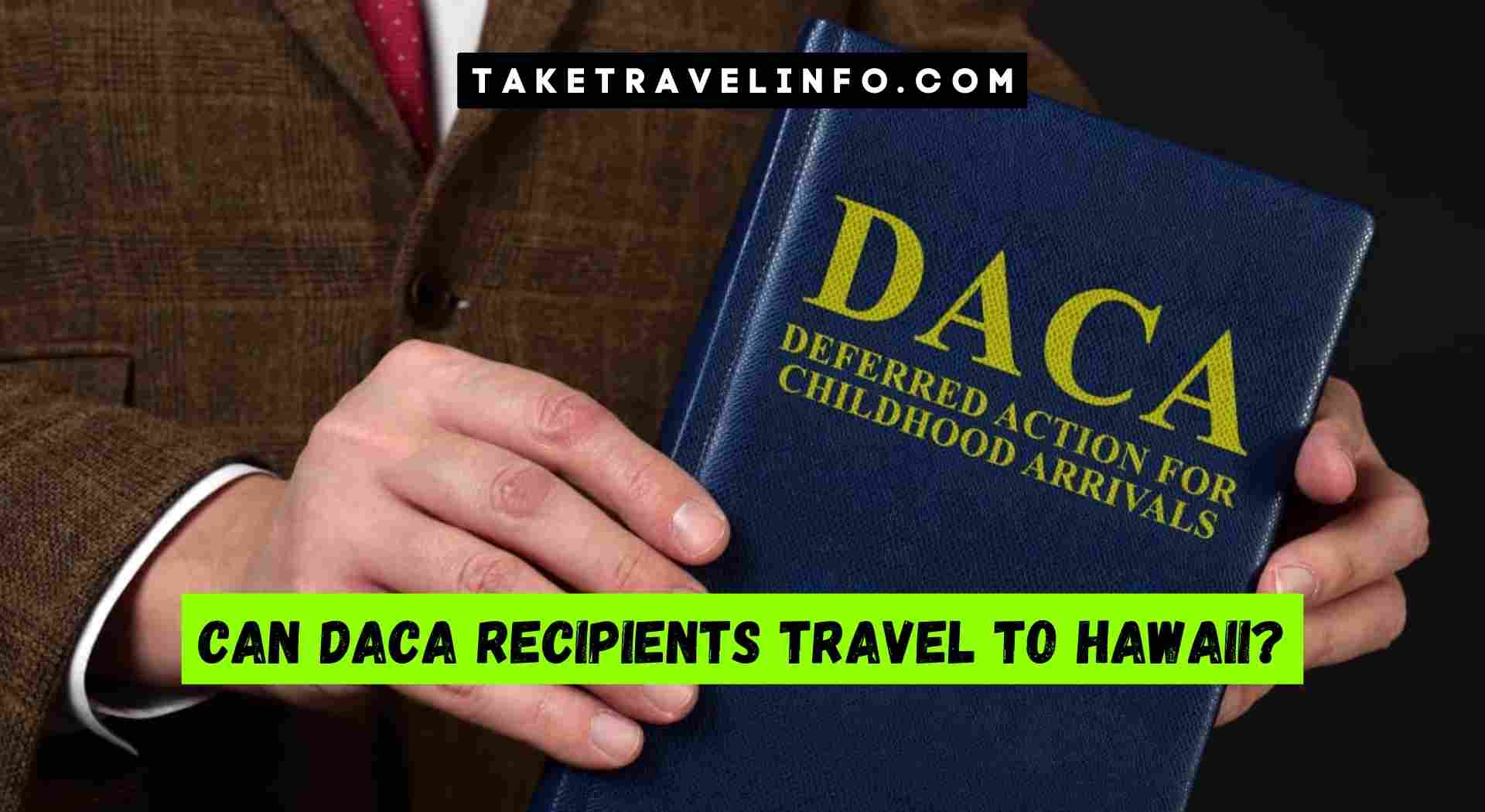Daca recipients can travel to Hawaii without any legal restrictions. Hawaii, with its breathtaking landscapes and idyllic beaches, has always been a dream destination for many travelers.
Whether you are a us citizen, a lawful permanent resident, or a daca recipient, the good news is that you can visit this tropical paradise without any legal barriers. Thanks to the deferred action for childhood arrivals (daca) program, which provides temporary protection from deportation and work authorization to certain individuals who were brought to us as children, daca recipients have the freedom to travel within the country, including to beautiful Hawaii.
So, if you are a daca recipient looking to explore the stunning beaches and adventurous activities that Hawaii has to offer, you can pack your bags and embark on an unforgettable journey without worrying about your immigration status.
Background Of Daca Program
- The data (deferred action for childhood arrivals) program was introduced in 2012 to provide temporary relief from deportation to undocumented immigrants who arrived in the united states as children.
- It was implemented through an executive order by president barack obama and offered protection from removal for qualifying individuals, along with authorization to work in the country.
Eligibility Requirements For Daca Recipients
- To be eligible for daca, applicants must have arrived in the u.s. before turning 16 and must have continuously resided in the country since June 15, 2007.
- They must have been under the age of 31 as of June 15, 2012, and should have no lawful status in the u.s.
- Individuals must have completed or be enrolled in high school, obtained a GED, or be an honorably discharged veteran of the u.s. armed forces.
- Applicants must have a clean criminal record, as certain offenses can lead to disqualification.
Impact Of Daca On Travel Privileges

- Daca recipients, also known as dreamers, have been granted certain travel privileges. However, it is important to understand the limitations and restrictions involved.
- Daca does not provide automatic authorization for international travel. Dreamers must first apply for and be granted advance parole, which serves as permission to leave and re-enter the u.s. Without abandoning their data status.
- Advance parole can be obtained for humanitarian, employment, or educational purposes, and the application process involves submitting the necessary documents to u.s. Citizenship and immigration services (uscis).
- Once approved, daca recipients can travel internationally and re-enter the u.s. Without the fear of being barred from returning. This allows them the opportunity to visit enchanting destinations like Hawaii while maintaining their data protection.
So, while daca recipients are not restricted from traveling to Hawaii or any other location, careful planning and adherence to the specific processes outlined by uscis are essential. With the appropriate documentation and approval, dreamers can embark on memorable journeys to explore the breathtaking wonders of the aloha state.
Current Travel Restrictions For Daca Recipients
Daca recipients face certain travel restrictions that may impact their ability to travel to Hawaii. They need to understand these restrictions to plan their trips accordingly. Here are the key points regarding the current travel restrictions for daca recipients:
- Daca recipients are generally not allowed to travel outside of the united states, as their Daca status is considered valid only within the country’s borders.
- Travel outside of the united states without prior approval from u.s. Citizenship and immigration services (uscis) may result in the termination of daca status.
- Daca recipients can request permission to travel outside of the country through a process called advance parole.
- Advance parole grants temporary permission for daca recipients to travel internationally for specific reasons such as education, employment, or humanitarian purposes.
- The approval of advance parole is not guaranteed and daca recipients should carefully consider the risks involved before planning any international travel.
- Travel to Hawaii, being a part of the United states, is generally not considered international travel for daca recipients.
- However, daca recipients should carry their daca documentation and identification when traveling to Hawaii or any other u.s. state to avoid any potential issues or confusion.
By understanding the current travel restrictions for daca recipients, individuals can ensure that their travel plans align with the guidelines set forth by users. It is always recommended to stay updated on any changes or updates to these restrictions to maintain compliance and avoid complications during travel.
Cultural And Educational Opportunities
Hawaii, with its rich cultural heritage and vibrant educational scene, offers numerous benefits for daca recipients seeking to expand their horizons through travel. Here are some key points to consider:
- Immerse yourself in the unique Hawaiian culture, including traditional dances, music, and cuisine. Experience the aloha spirit firsthand, as you interact with locals and learn about their customs and traditions.
- Explore the stunning natural beauty of the islands, from the majestic volcanoes on the big island to the breathtaking waterfalls of Maui. Hawaii’s diverse ecosystem provides a wealth of opportunities for outdoor enthusiasts and nature lovers alike.
- Visit historical landmarks and museums that offer insights into Hawaii’s past, such as pearl harbor and the Polynesian cultural center. Gain a deeper understanding of the islands’ history and its significance in shaping Hawaii’s identity.
- Enroll in educational programs and workshops that focus on Hawaiian language, art, and history. Gain valuable knowledge and cultural insights that can enhance your understanding of diverse perspectives and broaden your worldview.
Employment And Internship Opportunities
Traveling to Hawaii as a daca recipient not only allows you to explore the beauty of the islands, but also presents unique employment and internship opportunities. Consider the following:
- Hawaiian tourism industry: With millions of visitors annually, Hawaii’s tourism sector offers various job openings in hotels, resorts, restaurants, and excursion companies. Utilize your skills and talents to secure employment in this thriving industry.
- Internships in sustainable agriculture: Hawaii’s fertile lands and tropical climate create ideal conditions for sustainable farming. Explore internships at organic farms and learn about innovative agricultural practices that promote ecological balance and food sustainability.
- Opportunities in marine conservation: Hawaii’s pristine waters are home to diverse marine life. Engage in internships with organizations dedicated to protecting and preserving these fragile ecosystems, gaining hands-on experience in marine conservation efforts.
- Volunteer programs: Many local organizations in Hawaii offer volunteer opportunities in community development, social work, and education. Contribute your skills and knowledge while making a positive impact in the local community.
Networking And Community Engagement
Traveling to Hawaii as a daca recipient not only provides cultural and educational experiences but also offers opportunities for networking and community engagement. Consider the following benefits:

- Connect with like-minded individuals through community events, workshops, and cultural festivals. Build relationships and establish a support system within the local community.
- Engage with local advocacy groups that support immigrant rights and provide resources for daca recipients. By participating in their initiatives, you contribute to the ongoing efforts of these organizations and strengthen your network.
- Attend professional networking events and conferences to expand your professional connections. Hawaii’s vibrant business community provides ample opportunities to meet industry professionals and establish valuable contacts.
- Join local volunteering initiatives, such as beach cleanups or community outreach programs. Engaging in these activities not only allows you to give back to the community but also helps you connect with individuals who share your passion for making a positive difference.
Embarking on a journey to Hawaii as a daca recipient brings an array of cultural, educational, employment, and networking opportunities. Step outside your comfort zone, embrace the spirit of aloha and discover the limitless possibilities awaiting you in the enchanting Hawaiian islands.
Frequently Asked Questions On Can Daca Recipients Travel To Hawaii
Can Daca Recipients Travel To Hawaii With Their Work Permit?
Yes, daca recipients can travel to Hawaii with their valid work permits. As long as they have their daca status and work authorization document, they can freely travel within the united states, including to Hawaii. Travel restrictions typically only apply to international destinations.
What Documents Do Daca Recipients Need To Travel To Hawaii?
To travel to Hawaii, daca recipients need to have their valid work permit (employment authorization document) and their daca approval notice. These documents serve as proof of their daca status and work authorization, allowing them to travel within the united states.
Are There Any Travel Restrictions For Daca Recipients Visiting Hawaii?
No, there are no specific travel restrictions for daca recipients visiting Hawaii. They can freely travel to and within Hawaii, just like any other individual with valid legal status in the united states. It is important to carry their data and work authorization documents when traveling.
Can Daca Recipients Fly To Hawaii Without Any Issues?
Yes, daca recipients can fly to Hawaii without any issues as long as they have their valid work permit and daca approval notice. Airlines typically require a valid government-issued identification document, which can include daca-related documents, to allow boarding and travel within the united states.
Are There Any Special Requirements For Daca Recipients Traveling To Hawaii?
No, there are no special requirements for daca recipients traveling to Hawaii. As long as they have their valid work permit and daca approval notice, they can travel to Hawaii like any other individual with legal status in the united states.
It is always recommended to carry the necessary identification documents when traveling.
Conclusion
While daca recipients have the right to travel within the united states, their ability to travel to Hawaii remains uncertain due to immigration policies. The Hawaii state government has an open-door policy for tourism, but federal regulations may pose challenges for daca recipients.
It is essential for individuals covered under daca to thoroughly research and understand their travel rights and limitations before planning a trip to Hawaii. Despite potential obstacles, there are resources available to help navigate the complex travel regulations. Consulting with immigration lawyers or advocacy organizations specializing in daca issues can provide valuable guidance and ensure compliance with all requirements.
As immigration policies continue to evolve, daca recipients must stay informed regarding any changes that may impact their ability to travel to Hawaii or other destinations. By being proactive and seeking appropriate guidance, daca recipients can make informed decisions about their travel plans while prioritizing their safety and legal rights.

